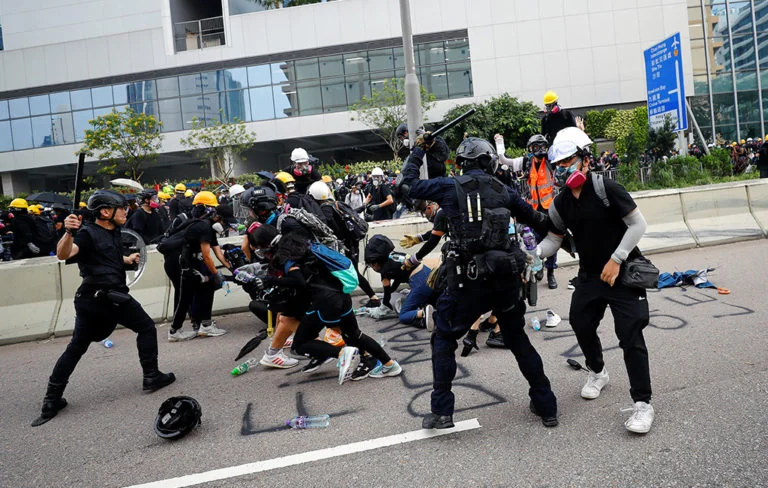Hong Kong’s businesses and metro stations reopened as usual on Monday after a chaotic Sunday when police fired water cannon, tear gas and rubber bullets at protesters, who blocked roads and threw petrol bombs outside government headquarters.
On Sunday what began as a mostly peaceful protest earlier in the day spiraled into violence in some of the Chinese territory’s busiest shopping and tourist districts.
Thousands of anti-government protesters, many clad in black masks, caps and shades to obscure their identity, raced through the streets, engaging in cat-and-mouse tactics with police.
Also setting street fires and blocking roads in the heart of Hong Kong where many key business districts are located.
The demonstrations are the latest in nearly four months of sometimes violent protests.
Protesters are furious over what they see as creeping interference by Beijing in Hong Kong’s affairs in spite promises by Beijing to grant the city wide-ranging autonomy and freedoms denied in mainland China.
Dozens of university students rallied peacefully on Monday afternoon urging authorities to listen to public demands.
Dressed in black, some of them donning face masks, students sang “Glory to Hong Kong” a song that has become a rallying cry for more democratic freedoms in the semi-autonomous Chinese hub.
At Baptist University hundreds of students also marched to demand the university’s management offer support to a student reporter arrested on Sunday.
The initial trigger for the protests was a contentious extradition bill, now withdrawn, that would have allowed people to be sent from Hong Kong to mainland China for trial.
The protests have since broadened into other demands including universal suffrage and an independent inquiry into allegations of excessive force by the police.
Hong Kong, a former British colony, returned to China in 1997 under a “one country, two systems” formula that guarantees freedoms not enjoyed on the mainland – including a much-cherished independent legal system.
Kung Lui, a third-year university student majoring in sociology, said the protests would continue until all five demands were met.
“The protests have revealed lots of social problems and proved that democracy and freedom are the core values of Hong Kong people.’’
Police on Monday said 89 people were arrested over the weekend after “radical protesters” attacked two police officers on Sunday evening, hurling petrol bombs, bricks, and threatening the safety of the officers.
Nearly 1,500 people have been arrested since the protests started in June.
At least 18 people were injured, three of them seriously, during Sunday’s violence, according to the Hospital Authority.
The protests have weighed on the city’s economy as it faces its first recession in a decade, with tourist arrivals plunging 40 per cent in August amid some disruptions at the city’s international airport.
Democratic lawmaker Ted Hui was arrested for allegedly obstructing police, according to his Democratic Party’s Facebook page, as he tried to mediate on the streets in North Point. (Reuters/NAN)





2 Comments